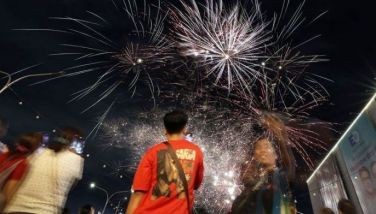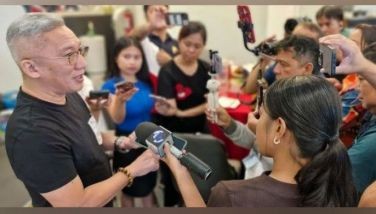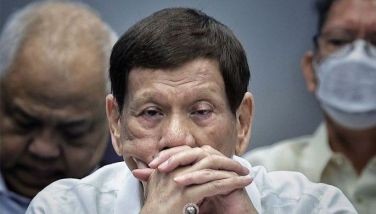Paltik
CEBU, Philippines - In front of his small shack, in a clattered table, Lauro (not his real name) is fitting the steel barrel to a body of what would be an Ingram sub-machine pistol. He said he will have the thing ready for test-firing in the next three to four days. He does not have a buyer for it yet, but Lauro said he will just show it to the “stockholders†who may be interested in getting it. A stockholder, in gun-maker's lingo, is someone who buys locally-made guns and sells it to individuals for a higher price.
The price of Lauro's Ingram, sans the protective coasting, is P6,000. But it could go down to P5,000, or P4,000 if the going gets tough, he said. Lauro needs to sell it once done, as the money will be used to feed his large family - his wife and their 10 children.
Lauro is just one of the thousands of illegal gun-makers in Danao City. He said he would have wanted to have a legitimate job, he was a construction worker before he became a gunsmith, a legit one before the shop he was working was shutdown about 10 years ago, but there is just no opportunity for him.
“The jobs here in Danao are only for those who have backers in the government,†he said. And for lack of other means of earning, following the closure of the gun-making factory where he learned the trade, Lauro packed his tools and brought them to his home to start his own backyard gun-making trade.
The 38-year-old family man admitted that since he started his business, he has made several guns already, mostly KG-9s, armalites or baby armalites and Ingrams. He said it would only take him a maximum of two weeks to finish an Ingram, or less if the materials are readily available, as some of these, like the barrels and some parts, have to be ordered at a gun-making factory. Two weeks for P6,000 or P12,000 for a month, not bad as opposed to his P250 per day as a construction worker, he said. And his capital for most of the guns he makes is only P1,500 each, he said.
Lauro guarantees that his guns are of good quality. “I forge them based from their original designs. If my products are not good, I would have been out of this business a long time ago,†he said. Lauro's finished products have yet to undergo “blueing†or what he termed in Cebuano as “tuslob,†wherein the unit is submerged in acid and chemicals to produce protective coating. But he clarified that his gun is ready for use. Lauro has his own testing area, a small soundproof hole he dug near the base of his worktable. He said he designed it to prevent gunshot sounds from disturbing his neighbors.
Juanito Mata, Danao City Cooperative Office chief, believes there could be thousands of illegal gun-makers in their city. He said that although the present administration is open to legalizing this industry, it will not be done overnight considering the long process. He also noted that the failure of the Workers League of Danao Multi-Purpose Cooperative (World-MPC) proves that these gun-makers are not serious with the city's thrust in legalizing their trade. Mata said before the World-MPC was closed, its members were given another year to comply with the requirements of the Firearms Explosives Security Service Agency and Guards Supervisory Section or FESSAGS, but they still failed. Under the agreement with the World-MPC, gun-makers can only make guns and their parts; they cannot sell these. As it happened, while using the World-MPC as front, allegedly the gun-makers were operating underground by secretly producing and selling their products outside the factory. Mata said FESSAGS records support this allegation, wherein no single gun from Danao City was reported to its office for licensing.
Mata believes the gun-makers opted for the underground trade as they can sell their products a lot cheaper, and when these are cheap, the demand is high. Whereas if they will have their guns registered and brought to legitimate gun shops, the price goes up three to four times their usual price, which means only a few can afford it and the turnover of the products is slow.
Nonetheless, the local government is still finding ways to remedy the problem, as it believes it could not easily wipe out the industry that has been there for a long time. “It's not that we are condoning their illegal activities, we just don't want to completely uproot them from their trade. Because if we do that many will suffer,†said Mata, adding the recent series of raids, which took a toll in the families of the affected gunsmiths. Mata said they are leaving the matter to the PNP. He, however, said the administration of Mayor Ramon “Boy†Durano Jr. has a standing plan to provide alternative livelihood to the gun-makers; the plan has however met opposition from the non-allied City Council.
According to a FESSAGS Region 7 report prepared by its chief, Rex Derilo, and submitted to PRO-7 director Chief Supt. Marcelo Garbo Jr., the gun-making industry in Danao City started in 1905 to1906. It was legit until the World War II when the gun-makers who went underground and joined the guerilla movement were hired by the United States Army Forces in the Far East (USAFFE) to re-chamber the Japanese Ansaka rifles to fit the US 30 caliber round or to keep the original Japanese rifle in working condition.
In 1960s, the public started using “paltik†to refer homemade guns.
With the upsurge of cheap guns, civilians then started acquiring these, to which FESSAGS attributed to the public's increased interest in taking the law into their own hands “by arming themselves.†The public acquires these guns through whatever means necessary “may it be legally or otherwise,†the report said.
The increase in firearm-related incidents increases the demand for acquisition of firearms, according to the report, adding that Danao's illegal gunsmiths “admitted to have experienced mass productions every time elections are approaching,†and politicians are among their “steady stream†of buyers.
Although there are efforts to curb the manufacture of illegal guns, Garbo said he does not want to enforce cat-and-mouse operations against the gun-makers since this does not entirely solve the problem. A comprehensive program to address Danao's illegal trade, he said, is needed with the involvement of the police, the gun-makers and the local government unit.
Garbo said that like his superior, PNP chief Alan Purisima, he does not support moves to legitimize the gun-making business in Danao as it may lead to the production of substandard guns.
“The chief PNP would like to adopt the Shooters model wherein yung mga gun-makers sa Danao i-employ by legit gun manufacturers. Dahil kahit i-legalize ko 'yan, his point is balu-balo kayo, small-time makers. They don't have state-of-the-art equipment, so lahat na gagawin nila will only end up to local consumption, particularly to the criminals,†Garbo said in reference to Shooters Gun Manufacturing Firm in Tipolo, Mandaue City.
The PNP Firearms and Explosives Office (FEO) records, as of Dec. 31, 2012, show that there are 1,622,948 registered firearms in the country. Of this number, 134,000 were licensed when an amnesty program was implemented in 2009. It also reveals that in Central Visayas, only 70,519 guns are registed or 4.3 percent of the total registered firearms in the country. “This means that majority of the illegal manufactured guns in Danao City may have been shipped to other places in the country,†the FESAGGS report said. Reportedly, Danao City is the main supplier of guns all over the country especially in the Mindanao area. Presently, Cebu has only three legitimate gun manufacturers - Shooters, Ferfrans and Safariland.
Based on police records, Derilo said crimes perpetuated by gun-for-hire criminals are “the evident consequences brought about by illegally-made guns.â€
The PNP's Firearms and Explosives Sections records in 2012 revealed that 779 or 89 percent of the firearms recovered, confiscated and captured were unregistered, while 99 percent of these are homemade or paltik.
Countless loose firearms are being produced each day, to which the authorities have lost count of. FESSAGS cited that the situation has been so as the gun-making business has become a lucrative source of income for Danao's backyard gunsmiths.
A machine pistol, a UZI or Ingram, for example, already complete with the necessary coating is sold for P12,000. A capital for this kind of pistol is P6,000, thereby gaining the gun-maker a whooping P6,000.
The Danao-made caliber .45 pistol, meanwhile, is priced at P8,000 in the prevailing market, with only P4,000 as capital, P4,000 goes to the guerilla manufacturer. A caliber .38 revolver, meanwhile, comes a lot cheaper, P1,500, minus the P1,000 operating cost, leaving P500 as net income to the maker.
A far cry if gun-makers go legit working under a cooperative, like they did before, wherein they have to split the proceeds from their sale of 10-15 firearms a week. The World-MPC at the time of its operation had more than 100 members. The said cooperative, established in 1994, was shut down in 2010 for non-compliance of FESSAGS policies. Derilo said for 15 years since it started operation, not one production report was submitted to their office. He said the gun-makers under this coop were using the legitimacy of their organization as front for their underground activities, where they manufactured and sold guns outside their factory.
In 2011, Danao City Mayor Ramon “Boy†Durano Jr. and Mata invited the displaced gun-makers in a conference for the future of World-MPC, but because of the political dispute between the sitting mayor and the City Council, plans were set aside.
Derilo said “countless efforts were made†on the part of law enforcement and cases were filed, but these were “instantly dismissed†at the Danao Prosecutor's Office, or at the Danao City Regional Trial Court. Causes for dismissal are usually technical deficiencies. And while FESSAGS believed that the problem could be in the judiciary, it also said “in most instances, it is sad to note that decisions and discretions of our prosecutors were either tainted or based and political transcriptions.†Motions for reconsiderations were filed, but these, too, were not successful.
Derilo agrees that legitimizing the gun-making business in Danao City “will not in any way address the illegal gun industry.†He said Shooters has employed more than 300 gunsmiths from Danao, all of whom were into the illegal trade. Yet “it did not address the problem…guerilla type of illegal gun-making still exists these days,†albeit the “intensified law enforcement operations.â€
Hence, part of FESSAGS' recommendation, as stipulated in its report, is for the creation of a Special Court outside of the judicial jurisdiction of Danao City RTC. This court will hear cases of illegal manufacturing of guns in the said city to prevent “intervention from the (local) government.â€
Among the solutions that FESSAGS has come up with is for the government to attract investors to the gun-making business instead of going for the cooperative-type, which has been proven ineffective. The government should also focus on providing “consistent, applicable and beneficial†livelihood programs for backyard gunsmiths like Lauro, who engage in illegal gun-making no matter how illegal and risky just to provide food on the table for their families. — /QSB (FREEMAN)
- Latest

























